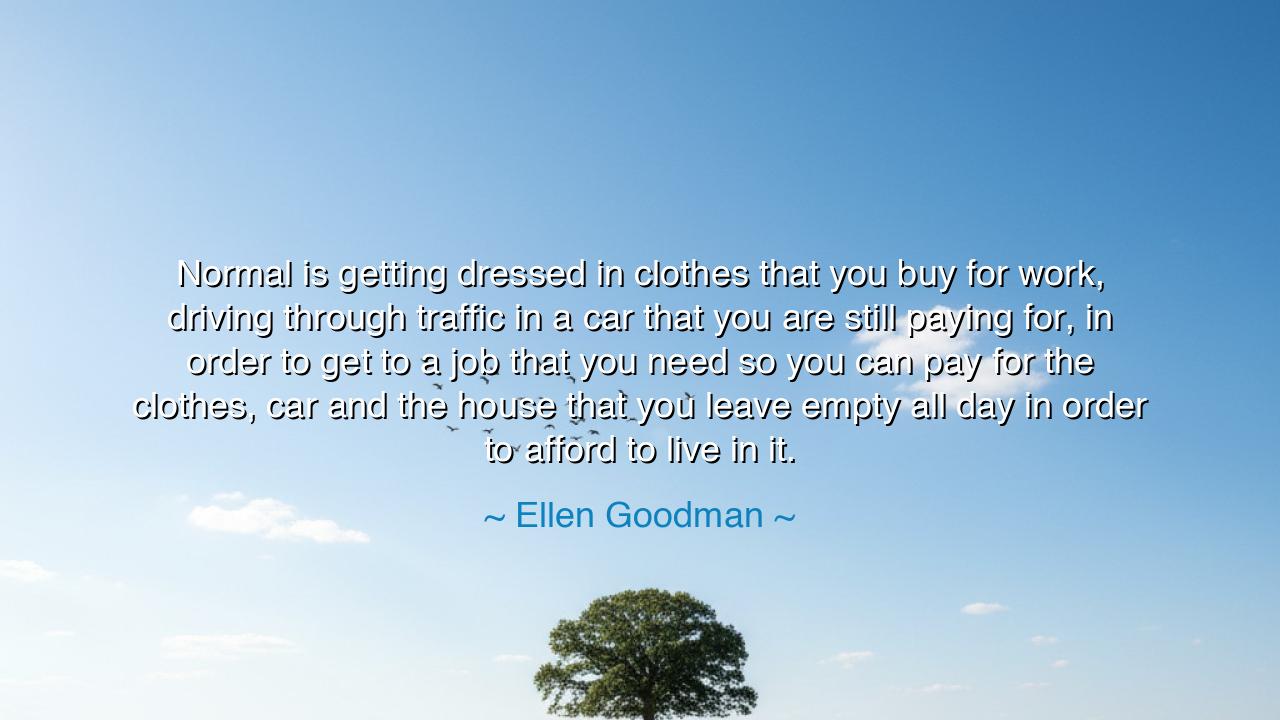
Normal is getting dressed in clothes that you buy for work
Normal is getting dressed in clothes that you buy for work, driving through traffic in a car that you are still paying for, in order to get to a job that you need so you can pay for the clothes, car and the house that you leave empty all day in order to afford to live in it.






The keen observer of modern life, Ellen Goodman, once revealed with piercing clarity: “Normal is getting dressed in clothes that you buy for work, driving through traffic in a car that you are still paying for, in order to get to a job that you need so you can pay for the clothes, car and the house that you leave empty all day in order to afford to live in it.” In these words she unmasks the endless cycle of normality, a circle where labor and possessions chase each other without rest, leaving the soul weary and unfulfilled.
This normal life, so often praised as stability, is in truth a treadmill—motion without progress, toil without peace. The clothes, the car, the house—all become symbols of achievement, yet they bind the worker to chains of debt and duty. What seems success is often quiet bondage, where the fruits of labor are consumed by the very means of labor itself. Thus Goodman teaches us that normal is not freedom, but a cage gilded with routine.
Consider the irony: the house, which should be sanctuary, stands empty by day; the car, meant to carry one into new journeys, is shackled by endless payment; the job, meant to provide for life, becomes the devourer of life itself. In this cycle, man becomes servant not to purpose, but to possessions. The joy of living is traded for the maintenance of what was supposed to bring joy.
Goodman’s words echo like the cries of prophets, warning against the idolatry of endless striving. They call us to awaken—to see that what is called normal may not be natural, and what is accepted by the many may not be worthy of the soul. She reminds us that the heart was not made only to toil, but to rest, to love, to create, to dwell fully in the life it has been given.
So let this wisdom be carried forward: do not mistake the cage of normal for the wings of freedom. Question the cycles that drain your spirit. Seek instead the balance where labor serves life, not the other way around. For life is not meant to be consumed by the keeping of things, but to be lived in fullness, simplicity, and truth. In this lies the courage to step beyond normal, and to walk instead in freedom.






KGNguyen Thi Khanh Giang
Ellen Goodman’s quote speaks to the heart of what many people experience—being stuck in a cycle of work and consumption. It’s almost like we’re working to pay for our lives but never truly living them. Do you think this is something we’re taught to accept as ‘normal’, or have we built this pattern ourselves? How can we create a new definition of normal that doesn’t revolve around constant consumption?
TLTrang Le
This quote makes me think about the ways in which our priorities are often misaligned with what truly brings us joy. It’s easy to get swept up in a routine of working just to afford the things we need to work for. Do you think society should rethink what ‘normal’ really is, especially when it comes to work-life balance? How can we redefine success in a way that focuses on happiness over material wealth?
TL7/1 Le Hoang Thinh lop
Ellen Goodman’s quote paints a very relatable picture of modern life. It feels like we’re stuck in a cycle of working to afford things that, ironically, prevent us from enjoying life to its fullest. Do you think this is a result of societal pressure to ‘keep up with the Joneses’? How can we shift our focus toward living in the moment and being present, rather than always working for more?
TNTran Nguyen Thao Nguyen
This quote really resonates with the daily grind that many of us go through. It’s easy to get caught up in the idea that we need more to live comfortably, but at what cost? Do you think people often sacrifice their happiness for the sake of maintaining the ‘normal’ lifestyle that society expects? What would it look like if we lived in a way that prioritized life over possessions?
DTThuy Duong Tran
Ellen Goodman’s quote really makes you reflect on the cycle of modern life. It’s almost as if we’re caught in a loop where we work to afford things that we don’t even get to fully enjoy. Do you think this cycle is necessary for survival, or have we built a system that makes us prioritize material possessions over personal fulfillment? How can we break free from this pattern?